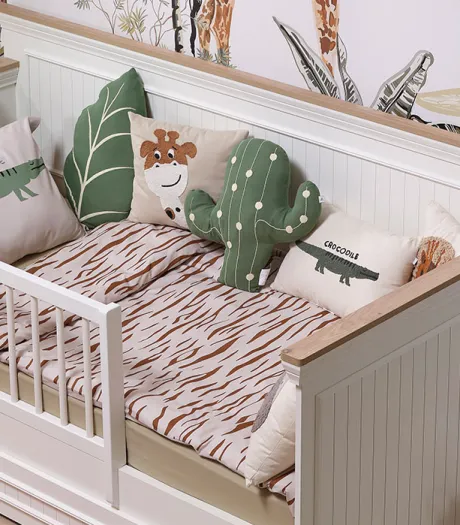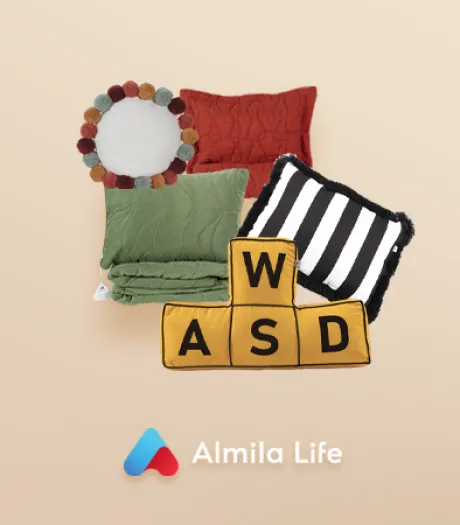
In the first days when your baby comes home from the hospital, determining the most appropriate sleep pattern and place for him is one of the important decisions parents face. Initially, room sharing is frequently preferred, as it is thought to be safer and more practical for both the baby and the parents. In this process, the aim is to meet the baby's needs quickly and easily. But over time, especially as the baby gets older, parents may want to rearrange their own bedrooms for special personal and couple times. This could be for different reasons, such as spending quality time with your partner or being able to watch your favorite TV series without needing headphones. However, deciding when and how to separate the baby's room can be a challenging process for many parents. In this article, we have compiled information about when babies' rooms should be separated, when babies should sleep in their own rooms, important information about the process of separating the baby's room, points to consider, and ways to make this process as smooth and positive an experience as possible for both you and your baby. But first, we will talk about the age until which baby should sleep with the mother.
Until what age should a baby sleep with its parents?
The question "Until How Old Should a Baby Sleep with Its Parents?" is an issue that parents often encounter and is of critical importance for the healthy development of babies. In this context, under the guidance of the World Health Organization (WHO) and the American Academy of Pediatrics, when should babies sleep with their parents? Decisions about whether babies should sleep in their own room should be made with great care.According to the recommendations, in order to maximize their health and safety, it is recommended that babies sleep in the same room with their parents but in a separate bed for at least the first 6 months, and ideally for the first 12 months. The main goal of this application is to minimize the risk of sudden infant death syndrome (SIDS) and to create a safe sleeping environment for babies. These suggestions are the answers to questions that parents wonder about, such as "until what age should babies sleep with their mothers" and "when should the baby go to their own room?" This guidance also sheds light on the question "at what age should a baby be put to sleep in a separate room?", so that parents can make an informed decision about when they can safely move their babies to their own room.

Sudden Infant Death Syndrome (SIDS) and Its Prevention
Sudden infant death syndrome (SIDS) is the death of babies under one year old, usually during sleep, for no apparent reason. Studies have shown that having babies sleep in the same room with parents significantly reduces the risk of SIDS. This happens because parents can monitor their babies more closely and spot any problems more quickly.
Things to Consider When Leaving the Baby Room
The baby room separation process is an important milestone for parents. Answers to questions such as when should the baby sleep in a separate room and until what age should babies sleep with the mother are important for both safety measures and emotional bonds. Experts generally state that the most appropriate time for babies to move to their own rooms should be individualized, but it is generally accepted that babies can be placed in a separate room starting from six months and that it is appropriate for them to move to their own rooms after the age of one.
Security precautions
In addition to the question of when the baby should go to his/her own room, safety is the top priority in the process of separating the baby's room. When answering questions such as when to separate the baby's room and at what age the baby should be put in a separate room, you should make sure that the crib is safe and that any potentially dangerous items in the room are removed. Baby monitors and other safety equipment allow parents to monitor their babies even if they are in different rooms.
Maintaining Sleep Patterns
The issue of when the baby should go to his own room is also closely related to maintaining sleep patterns. Babies' sleep patterns play a vital role in their healthy development. The answers to questions such as when should babies sleep in their rooms and at what age should babies be separated from their rooms may vary depending on the individual situation, but continuity of sleep routines ensures that this transition is as smooth as possible.
Maintaining the Bond Between Baby and Parent
The question of how to separate the baby lying next to the parents is also important in terms of maintaining the bond between the baby and the parents. The answer to the question of how long should the baby sleep next to the mother can help strengthen this bond and create a safe bond between the baby and the parent. Parents should continue to spend quality time with the baby during the transition, practicing calming routines before putting them to bed.

Problems and Solutions That May Be Encountered During the Baby Room Separation Process
The process of reserving a baby room can bring some challenges for both babies and parents. The problems that may be encountered in this process and the solutions to them are listed below:
Sleep Problems
When the baby room is separated, babies may experience disruptions in their sleep patterns. The baby may wake up more often or stay awake for longer periods of time until he gets used to his new environment. It is important to focus on sleep training of babies and maintain their sleep routines. Calming rituals before going to sleep, using a night light, and objects such as sleeping companions can help the baby get used to his new environment.
Separation Anxiety
Separation anxiety, which begins in babies, especially when they are 8-10 months old, may become more evident when their rooms are separated. It is important to allocate extra attention and bonding time during the daytime to make the baby feel safe. Additionally, parents should reassure their babies by making their voices heard or opening the door before entering the baby's room.
Night Feeding and Care
For parents, having babies in a separate room may require more effort during night feedings and care. Placing the baby's room close to the parent's bedroom allows quick intervention in case of night waking. Additionally, baby monitors can also increase parents' comfort.
Parents' Concerns
Parents may worry about their baby's safety and feel the need to check in frequently. Security cameras and audio baby monitors allow parents to monitor their babies. These devices can help ease parents' concerns.
Reactions of Siblings
If there are older siblings at home, the baby room separation process may mean a change for them and they may react with jealousy. Involving older children in the process, explaining the new situation to them, and allocating special time for them can alleviate possible jealousy problems.
Establishing New Routines
The baby room separation process may require changes in parents' daily routines. Increasing the quality time spent with the baby, adapting daily routines to the baby room separation process, and adopting a flexible approach can help make this transition smoother.








































